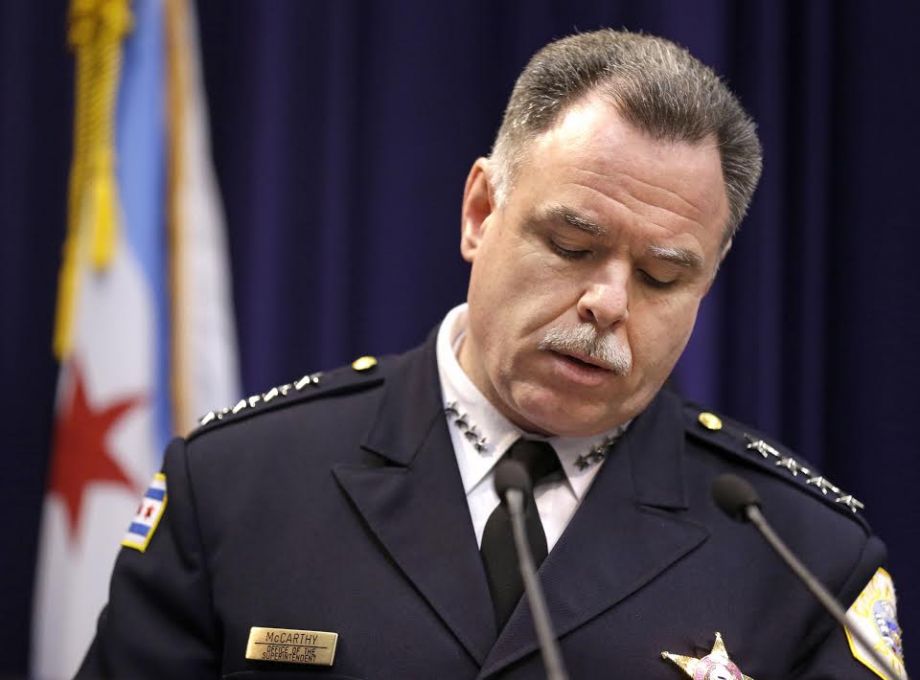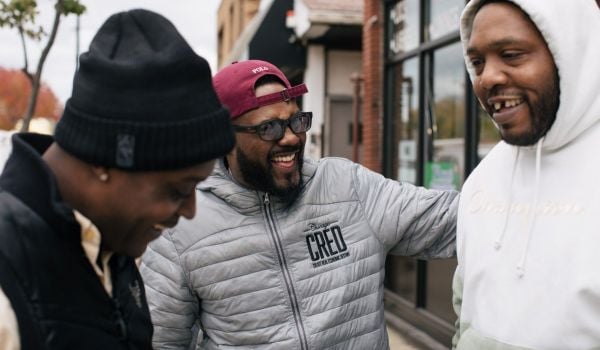Early on in this week’s Chicagoland, we meet Eric Wilkins, founder of the Broken Winggz Foundation, which gives support to people who have survived shootings. He’s playing in a national softball tournament for the wheelchair-bound, rushing across a makeshift diamond on the Soldier Field parking lot. This, along with hospital scenes of a family learning that their loved one might not walk again, signal that the episode will focus not only on the dead, but the wounded.
Wilkins uses a wheelchair, though at times he can get by using his dapper cane. He visits the home of a neighborhood teen, Maurice Knowles, who was shot dead while sitting on his front porch on Labor Day. Friends gather outside for a memorial. Some of them head to a party across the way. Soon enough, two girls swing at one another — it’s one of those fights that’s quickly contained, only to erupt again moments later. Wilkins gets up to play the role of peacemaker, but the fight escalates. By the time he arrives, he can only stand by and watch it all go down. Shots are fired, but no one seems to get hit.
More gunspray happens, just offscreen. As the episode unfolds there are two more murders, the first presumably in retaliation for the Knowles killing, quickly followed by the shooting death of one of Knowles’ friends. It’s awful to watch and utterly unsurprising. If you were somehow unaware of the city’s murder epidemic, Chicagoland devotes its prime real estate every week to making sure viewers know about the body count and the faces of dozens of the aggrieved.
We’ve met community figures like Wilkins throughout the series. We’ve watched tearful, traumatized families. This week, like the five weeks before it, the episode intersperses stories of terror and loss with developments of big projects that the city is working on, buildup to festivals happening in town, and quick trips to the ballpark. It’s really not that different from the balance you’d find on the nightly news, but with better production, longer soundbites from Mayor Rahm Emanuel and lingering looks at the people most affected, afforded by time, access and a documentarian’s touch.
I don’t really watch the nightly news. When I say that, I don’t mean that I don’t tune in. But I was raised in a city that, like Chicago, has a murder problem, and violence dominates our local anchors’ updates. They don’t re-report the same robbery in an attempt to monger fear, as I’ve heard tell about. The stories of the latest rape or murder are actually the latest and absolutely pertinent.
Yet it’s a twisted cycle that numbs the viewer to news of lives lost and blood shed, because the reporting is so routine. It’s one reason why a report finding that 246 Philadelphians died in one year comes as a relief — because 246 annual murders represents a 46-year low for my city. The nightly broadcast doesn’t grip me the way that, say, Game of Thrones does. It simply comes as a daily reminder that things haven’t changed.
Chicagoland has been a commanding program over the last six episodes. As I’ve written in previous recaps, the work of putting face to name and name to statistic is invaluable. But what Chicagoland struggles with, at this point, is becoming a song that sounds the same. Like the nightly news that feels disturbing yet ever familiar, Chicagoland’s coverage is beginning to hit softer as it becomes ritual.
Perhaps I’m fatigued from seeing so many faces and hearing no solutions. I’ve also written that the series sorely needs a wider window into police tactics. I’ve all but given up on that happening. Take this bit of dialogue from Chicago Police Superintendent Garry McCarthy, fielding a question on a call-in radio show from a frustrated school principal about why her students must live in fear:
I’ve got to be clear, Marlena. I’m responsible for reducing crime. But I’m not accountable nor am I in control of the things that cause it. Like poverty, education, breakup of the family unit. There’s been a gun violence for at least 100 years, but I’m sorry, I’m not going to take the blame for the history that puts us in the place we are.
A perfectly reasonable, truthful and dispiriting response.
McCarthy keeps it real in another interview in which a reporter asks why not let the problem take care of itself. (No, really, she asked that: “I don’t mean this to sound as callous as it may sound, but if the people who should be spending time behind bars end up getting killed, doesn’t that kind of resolve the problem for you?”)
“Oh come on, that’s crazy,” McCarthy says. “I’m not even going to respond that. The answer to that is no. Because those individuals, they have children, they have parents, they have brothers and they have sisters, so what we’re saying is if they get killed, it’s okay? That’s outrageous. What’s the cost to the mother of a gang banger? What’s the cost of a human life?”
Chicagoland puts that question to viewers constantly and primes them to join in on the frustration. Of course the show can’t promise that things will improve and communities will heal. My local news anchors don’t promise that, and I don’t expect them to. But when anchors recount the next awful incident of violence, it feels so commonplace that it doesn’t stop me from jotting notes in my planner, making tea or sorting through laundry. Chicagoland is running the risk of having that same effect.

Cassie Owens is a regular contributor to Next City. Her writing has also appeared at CNN.com, Philadelphia City Paper and other publications.
Follow Cassie .(JavaScript must be enabled to view this email address)















